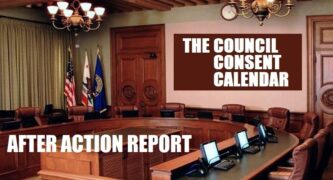
The City Council on Monday amended the City Manager’s Fiscal Year 2026 operating budget to recognize $358,641 in additional federal workforce funds, add two new limited-term positions, and convert two existing posts to permanent roles.
The action, recommended by the City Manager’s Department, stems from a higher-than-expected Workforce Innovation and Opportunity Act (WIOA) grant award from the U.S. Department of Labor to the Foothill Workforce Development Board. The funding, which surpasses estimates included in the adopted June budget, will support local programs aimed at connecting residents with jobs and addressing business workforce needs.
The amendments create two limited-term full-time positions: a Management Analyst IV to oversee grant compliance and fiscal reporting, and a Career Services Case Worker to help manage increased client demand.
The city will also convert two long-serving limited-term positions — a Management Analyst II and a Career Services Case Worker — to regular posts for consistency and equity, with support from both affected unions.
Officials emphasized the changes would not affect the city’s General Fund. The additional revenue and appropriations would be made within the WIOA fund, and the conversions of limited-term positions to permanent status carry no fiscal impact.
Here are the remainder of the items on Monday’s consent calendar.
- A new Water Conservation Manager position and approving pay raises for 10 existing classifications across the city’s utilities workforce, following recommendations from the Human Resources Department. The proposal establishes the Water Conservation Manager role at a salary control rate of $176,130. The position will oversee planning and evaluating long-term conservation programs for Pasadena Water and Power, while monitoring state and federal legislation affecting water efficiency and use. In addition to the new role, the resolution updates pay rates for classifications represented by the Pasadena Management Association, the International Brotherhood of Electrical Workers (IBEW), and the International Union of Operating Engineers (IUOE). Customer Service Supervisor and Customer Service Field Supervisor roles, both under PMA, will see their control rates rise from about $112,750 to $116,809. Technical classifications within the electronics and electrical series would also increase. Apprentice Electronics Technicians would move from $61.55 to $64.94 per hour, Electronics Technicians from $62.81 to $66.26, and Senior Electronics Technicians from $69.09 to $72.89. Electrical Testers will see hourly pay rise to $70.90, with Senior Electrical Testers moving to $77.99. Entry-level utility helper roles also gain adjustments. Electrical Craft Helper and Power Plant Mechanic Helper, represented by IBEW and IUOE respectively, would increase from $43.73 to $45.15 per hour. City staff said the updates are intended to keep compensation competitive in a tight labor market, ensure consistency between related classifications, and aid in recruitment and retention. No new full-time positions would be created beyond the Water Conservation Manager. The fiscal impact is estimated at up to $46,901 in Fiscal Year 2026 and $55,429 in Fiscal Year 2027. Roughly 78% of the costs would be borne by the Light and Power Fund, with the remaining 22% charged to the Water Fund. Staff said the increases will be absorbed within existing operating budgets, though adjustments could be requested midyear if needed.
- A resolution updating its management salary schedules to reflect previously approved pay changes for the Deputy Police Chief, Deputy Fire Chief and Police Commander classifications. The action follows a July 21 Council decision eliminating holiday pay for sworn non-represented management employees and folding the equivalent compensation into salary control rates. The adjustments apply retroactively to May 24, 2021 for Deputy Police Chief and to July 15, 2024 for Police Commander and Deputy Fire Chief. While Council already approved the revised salary rates, state retirement officials require updated salary schedules for compliance. The California Public Employees’ Retirement System (CalPERS) mandates that all compensation reported for retirement purposes be listed on a publicly available schedule approved by the governing body. To meet those requirements, staff has prepared nine revised salary schedules dating back to May 2021. Adoption of the new resolution ensures that the city’s pay structures remain valid for CalPERS reporting and that compensation earnable does not exceed posted maximums. The Human Resources Department emphasized that no new pay increases are being proposed. Instead, the revision aligns records with the adjustments already enacted by Council. Officials also noted the update carries no fiscal impact, since the revised pay rates were previously approved and accounted for in past budgets.
- Rejection of all contractor bids that came in well above the city’s estimate. Six bids were submitted by the July 14 deadline for the project, which was expected to cost about $966,000. The lowest responsive bid, from KASA Construction, Inc., totaled more than $1.07 million — over $100,000 above the city engineer’s estimate. Other proposals ranged as high as $1.56 million. One bid was deemed nonresponsive. Public Works officials said the cost overruns prompted a review of the project scope. The department now plans to reissue the solicitation in hopes of securing bids that better align with the available budget. Brenner Park, located at 235 Barthe Drive, spans two acres and includes a baseball field, tennis and basketball courts, and a playground. The existing play equipment, installed in 2009, has become outdated and is rarely used, according to staff. Following four public outreach events, residents overwhelmingly supported moving the new playground to a site adjacent to the basketball court and picnic area. Officials emphasized that rejecting the bids carries no fiscal impact, since no contracts will be awarded.
- A three-year, $5.2 million plan to replace dozens of aging police vehicles, awarding contracts to five vendors to ensure the department maintains a reliable fleet while gradually adding electric models. The City Council is scheduled to authorize five contracts totaling up to $5,266,731 for the purchase and outfitting of patrol cars, motorcycles and support vehicles. The plan is part of the Police Department’s fleet replacement program, which targets about 65 units for replacement over the next three years. Contracts include: Olathe Ford Sales, Inc. — up to $1.39 million for Ford pursuit vehicles and outfitting services. Long Beach BMW Motorcycles — up to $320,531 for six outfitted BMW RT motorcycles. PFVT Motors, LLC (Peoria Ford) — up to $1.11 million for Ford vehicles and electric vehicles. Sierra Monrovia CDJR, LLC — up to $1.87 million for 30 Dodge vehicles. Winner Chevrolet, Inc. — up to $575,294 for Chevrolet patrol and support vehicles. The Public Works Department’s Building Systems and Fleet Management Division maintains more than 1,100 city vehicles, including roughly 253 in the Police Department. Staff said procurement has been complicated in recent years by manufacturer shortages, limited order windows and supply chain issues, requiring multi-year agreements to avoid operational delays. While the city has begun integrating electric vehicles, officials noted that not all police functions can yet be served by EVs. Pursuit-rated safety standards, motorcycle requirements and round-the-clock availability remain barriers to a full transition. However, electric units are included in this procurement, and the city is expanding charging infrastructure to support future fleet electrification. The funding will come from the Fleet Replacement Fund, with no impact to the General Fund. Contingency allowances of 20% are included in each contract to account for market volatility. Public Works staff said the move strengthens public safety by ensuring that officers have reliable vehicles while keeping long-term sustainability goals on track.
- A contract worth up to $1.09 million to TDG Engineering, Inc. to begin design work on the city’s long-planned Greenways network of bike- and pedestrian-friendly streets. The proposal would authorize TDG to deliver conceptual development, preliminary engineering and potentially final design services for four north-south Greenway routes. The first phase, valued at $586,313, would produce conceptual and preliminary designs. A second phase, at the city’s option, would provide final design plans and specifications for $406,281. A $100,000 contingency is included in the contract. The Greenways were identified in Pasadena’s 2015 Bicycle Transportation Action Plan and studied in a 2021 feasibility report. They would add traffic-calming measures and improved crossings to make the following streets safer for people walking and biking: El Molino Avenue, from Atchison Street to Bonita Drive (3.8 miles), Wilson Avenue, from Washington Boulevard to California Boulevard (2.3 miles), Sierra Bonita Avenue, from Washington Boulevard to Colorado Boulevard (1.6 miles), Craig Avenue, from Paloma Street to Del Mar Boulevard (1.2 miles)
Proposed features include bicycle detection at signals, traffic circles, raised medians and new pedestrian crosswalks. A “quick-build” demonstration project on Craig Avenue would test some of the improvements before permanent construction. The city has assembled $12.6 million in funding for the Greenways project, including $12 million from Metro awarded in 2024, $450,000 from the state’s Affordable Housing and Sustainable Communities program, and $150,000 in local traffic reduction fees. TDG, the California affiliate of Toole Design, earned the top score in a competitive selection process. The firm previously worked with Pasadena on the Union Street Cycle Track and the Pedestrian Action Plan. If approved, design work is expected to begin in September.
- 17 hydrogen fuel cell electric buses under a contract worth more than $32 million. The City Council on Monday will consider authorizing the Department of Transportation to enter into an agreement with New Flyer of America, Inc. for the procurement of the 40-foot buses, along with an option to purchase two more in the future. The order, Pasadena’s first large-scale purchase of zero-emission vehicles, will replace aging renewable natural gas buses that have been in service since 2012 and 2014. Officials say the move aligns with the city’s Zero Emission Bus Rollout Plan, adopted in 2023, which calls for converting the entire Pasadena Transit fleet to clean vehicles by 2037. The new buses are expected to arrive in spring 2027, with a six-month commissioning period to train drivers, install fare collection systems and integrate Pasadena-specific technology. They will be fueled at a permanent hydrogen station now in design for 159 S. Kinneloa Avenue, scheduled to open the same year. Officials said fuel cell buses (FCEBs) offer greater resiliency than battery-electric buses because they are not dependent on the electrical grid. That allows them to continue operating during power shutoffs or emergencies, such as those caused by wildfires. City staff noted that to match the service range of 17 FCEBs, Pasadena would need as many as 34 battery-electric buses, doubling capital and operating costs. The contract includes a 10% contingency to cover manufacturing adjustments and potential federal tariffs on imported parts. Funding for the $32 million purchase is covered largely through state and regional grants, including the Volkswagen Mitigation Fund, Metro Measure M, Prop C, and the Carbon Reduction Program. Local matching funds will come from Proposition A and C revenues, with no impact to the city’s General Fund. Pasadena is also eligible for state hybrid and zero-emission bus vouchers that could lower the net cost by $720,000. The purchase will increase Pasadena Transit’s zero-emission fleet share from 2% to 46%, significantly cutting greenhouse gas and particulate emissions, according to city staff. If approved, the buses will be operated and maintained under Pasadena’s transit contract with First Transit, Inc.
- The City Council will receive the City’s quarterly investment report. No action is required. Pasadena’s investments climbed to more than $1.13 billion as of June 30, according to a quarterly report presented to the City Council Monday, reflecting strong market performance and the city’s continued focus on fiscal stability. The report, prepared by the Department of Finance, shows total funds under management increased by $212.5 million over the prior quarter, largely due to new general obligation bond proceeds and steady investment earnings. The city’s pooled investment portfolio alone rose by $12.5 million, boosted by $9.3 million in net investment income.
Among the highlights:
- Pooled Portfolio: $815.6 million, with an effective duration of 1.83 years and a 3.55% yield as of July.
- Investments with Fiscal Agents: up $199 million, reflecting deposits from new bond sales.
- PARS Section 115 Trust: up $620,088, after accounting for investment earnings and expenses.
- Capital Endowment Fund: decreased by $528,643 due to project expenses.
The city reported a strong liquidity position, with $101.9 million in short-term investments—exceeding its target of maintaining at least one month’s worth of operating budget in liquid assets. Finance officials noted that the city’s portfolio complies with Pasadena’s investment policy and state law, which emphasize safety, liquidity and yield. The report also highlighted broader economic trends in the second quarter, including 3% GDP growth, steady job gains, easing inflation at 2.7% year-over-year, and a sharp rebound in equity markets that lifted the S&P 500 nearly 11%. The city’s investments are managed across more than 100 internal funds, with the General Fund balance estimated at $94.2 million, or about 8% of the pooled portfolio. The report was provided for information only, with no action required by the council.
- More than $320,000 in federal Urban Area Security Initiative (UASI) grant funds to bolster emergency response, with allocations supporting fire, police and public health operations. The City Council on Monday will consider authorizing a contract with the City of Los Angeles, which administers the regional UASI program, and amending departmental budgets to recognize the funds. Of the total award, $200,185 will be added to the Fire and Public Health departments’ fiscal year 2026 budgets, while the Police Department has already incorporated $120,000 into its spending plan. According to a staff report, the Fire Department will receive $117,000 for urban search and rescue equipment to support Regional Task Force-4 and for structural collapse training props, plus $3,185 for Community Emergency Response Team (CERT) supplies. The Police Department will use its $120,000 share to acquire a mobile command vehicle equipped to serve as a communications and coordination hub during emergencies and major events. The Public Health Department is slated to receive $55,600 for consultants to provide Public Information Officer training and $24,400 for a prepositioned antibiotic cache, ensuring readiness for public health emergencies. Officials said all purchases will comply with city procurement policies. The grant is exempt from review under the California Environmental Quality Act because it does not involve new construction or physical changes. The Fire Department administers UASI funding locally. City staff emphasized that the funds carry no impact on the General Fund, as they are fully supported through the federal homeland security program.
- Amending the City Manager’s fiscal year 2026 operating budget Monday to recognize an additional $358,641 in federal workforce funds and expand staffing in the Career Services Division. The adjustment stems from a higher-than-expected Workforce Innovation and Opportunity Act (WIOA) Title I grant award, administered through the Foothill Workforce Development Board. The U.S. Department of Labor confirmed the award after the city’s budget adoption in June, requiring the council to formally update revenue and spending levels. The proposal would also authorize the addition of two limited-term positions — a Management Analyst IV and a Career Services Case Worker — to meet expanded program and compliance needs. In addition, the city would convert two long-standing limited-term jobs, a Management Analyst II and a Career Services Case Worker, into regular positions. City staff said the conversions will bring “internal equity and consistency” with other division staff. Both affected unions, the Pasadena Management Association and Laborers’ International Union of North America, were consulted and support the change. Officials emphasized that the changes carry no impact on the General Fund. The staffing increases are fully supported by the additional WIOA funds, while the conversions do not require new resources. The city said the move advances its workforce development priorities by expanding access to employment opportunities and career pathways for residents while providing businesses with stronger support in meeting local labor needs. The budget amendments require City Council approval.
- The City’s 2025 federal and state legislative platforms, documents that guide how staff and lobbyists advocate on key policy issues ranging from housing to climate change. The platforms serve as the city’s roadmap for responding to bills and legislative proposals, providing direction on when to support, oppose or remain neutral on measures that could affect city operations. According to a staff report, the documents are updated annually but can be amended at any time to address new issues. This year’s platforms carry only technical revisions from 2024, with no changes to Pasadena’s established policy positions. City officials said the updates come later than usual after the city’s emergency response to the Eaton Fire delayed council review. The platforms help staff coordinate with state and federal lawmakers, lobbyists, and organizations such as the League of California Cities and U.S. Conference of Mayors. The process allows staff to draft position letters, participate in coalitions, and track bills with potential local impacts. While most legislative activity affecting Pasadena occurs at the state level, city staff noted that with the Trump administration beginning its second term, federal activity is expected to increase. The city’s advocacy priorities remain focused on affordable housing, public health, and climate change, according to the report. Officials said approval of the platforms will have no fiscal impact, since lobbying and advocacy expenses are already budgeted.
- Support for state legislation aimed at strengthening wildfire prevention requirements for utilities in the wake of the devastating Eaton Fire earlier this year. The City Council will consider formally endorsing Senate Bill 256, authored by Sen. Sasha Renee Perez (D-Alhambra), which would require utilities to expand their wildfire mitigation plans (WMPs) to address risks in wildland-urban interface areas and improve coordination with local governments, fire departments and emergency responders. Pasadena Water and Power (PWP), the city’s community-owned utility, already incorporates those practices into its wildfire mitigation strategy, according to a staff report. Its plans cover vegetation management, system hardening, undergrounding of lines, and the use of public safety power shutoffs to reduce fire risk. SB 256 builds on those measures, mandating clearer communication processes between utilities and local agencies both in drafting wildfire plans and during emergencies. The push for additional safeguards comes after a Jan. 7 windstorm and wildfire caused widespread damage in Pasadena, knocking out power, toppling trees and leaving debris across the city. Recovery efforts remain ongoing with support from local, county, state and federal agencies. City officials said supporting SB 256 aligns with the council’s priority of ensuring public safety. The measure carries no fiscal impact for Pasadena. If approved, the council would authorize the mayor to send letters of support to state officials and lawmakers.
- Endorsement of a state bill authored by local Assemblymember John Harabedian that would require California to plan for the large-scale deployment of virtual power plants (VPPs) — a move city officials say aligns with Pasadena’s clean energy and reliability goals. The City Council will consider a recommendation to support Assembly Bill 740, which directs the California Energy Commission (CEC) to develop by November 2026 a statewide plan for expanding VPPs. The plan would identify resources, policies, and timelines needed to meet California’s load-shifting goals, evaluate how VPPs can contribute to grid reliability, and explore how they can reduce costs for ratepayers while cutting greenhouse gas emissions.Virtual power plants are networks of distributed energy resources — such as solar panels, battery storage, smart thermostats and heat pumps — that can be coordinated to reduce or shift electricity demand at scale. Pasadena Water and Power (PWP) has encouraged adoption of such technologies through rebates and tariff programs. Since 2023, the city has also participated in the state’s largest VPP pilot, the CEC’s Demand Side Grid Support program, which pays incentives to customers who reduce electricity use during grid emergencies. City staff said results from the pilot show that expanding VPPs could improve grid stability while delivering cost savings. PWP is currently working with large-load customers to increase participation in the program. The bill, amended in April, would not itself create new tariffs or programs but would require the CEC to recommend strategies for scaling up VPPs statewide. Officials said supporting AB 740 is consistent with Pasadena’s goals to advance sustainability and ensure public safety. The action would carry no fiscal impact for the city. If approved, the council would authorize the mayor to send letters of support to state lawmakers and regulatory agencies.
- Pasadena’s Community Police Oversight Commission (CPOC) is moving to formalize twice-yearly meetings with Police Department leadership in an effort to strengthen collaboration and improve community-police relations. The City Council on Monday will vote on approving the Rules and Regulations that establish regular biannual meetings between the commission’s chair and vice chair and the Pasadena Police Department’s chief and deputy chief. The Independent Police Auditor and support staff from the City Attorney’s Office will also attend. The CPOC unanimously approved the new rules on June 12, and the City Council’s Public Safety Committee endorsed them at its July 16 meeting. Final approval rests with the full council. Commission leaders began meeting informally with police executives in 2024 to build rapport and discuss oversight goals. The new rules make those meetings mandatory, requiring them to be held at least twice a year. Officials said the move ensures “consistent communication and collaboration” between the commission and police, enhancing the CPOC’s ability to fulfill its mission of improving transparency and strengthening community trust in law enforcement. The proposal carries no fiscal impact and falls under the state’s “common sense” exemption from environmental review. If approved, the rules will become part of the commission’s official procedures under Pasadena’s municipal code.
- A sweeping package of zoning code amendments aimed at streamlining development review, clarifying sign and awning rules, and bringing city codes into compliance with new state housing laws. The proposed changes, drafted by the Planning and Community Development Department, would update multiple sections of Title 17 of the Pasadena Municipal Code. The reforms touch on predevelopment plan reviews, design review thresholds, signage regulations, outdoor and temporary uses, accessory dwelling units (ADUs), parking standards, and employee housing provisions.
Among the most significant revisions:
- Predevelopment Plan Reviews (PPRs): The process, last updated in 2004, would become optional for new multifamily housing projects, reducing duplicative reviews. A new requirement would apply to projects seeking General Plan or zoning map amendments tied to new construction.
- Design Review: Multifamily projects of 20 units or fewer would be reviewed at the staff level, while larger projects would go before the Design Commission. Affordable housing projects with at least 50% affordable units would qualify for a streamlined “consolidated” review.
- Signs and Awnings: Updates would clarify standards by zoning district and add new design rules, such as requiring attachments into mortar joints for masonry facades and permitting neon tubing. Director-level review would be limited to historic resources and building identification signs.
- Outdoor and Temporary Uses: Regulations would be consolidated and modernized. Businesses could hold more outdoor sales and events annually, and temporary structures such as construction yards or real estate offices could remain up to 24 months.
- Accessory Dwelling Units: The city’s ADU ordinance would be amended in response to state housing department findings, allowing up to eight detached ADUs on multifamily properties, clarifying height and setback rules, and removing parking requirements in certain cases.
- State Legislation Compliance: Updates incorporate Assembly Bills 1308 (ending parking requirements for single-family additions), 2632 (requiring secondhand stores to be allowed by-right), and 2904 (expanding noticing periods for zoning amendments).
- Employee Housing: The code would be revised to align with the California Employee Housing Act, permitting small-scale employee and farmworker housing under specified conditions.
- Miscellaneous Changes: Parking requirements would be eased citywide for changes in use in older buildings, and animal grooming and hospital uses would be allowed by-right in more commercial districts. The package also addresses public noticing requirements, meeting continuances, and updates to definitions in the city’s zoning glossary. Staff said the amendments reflect years of study and incorporate feedback from prior commission study sessions and City Council committees.














 0 comments
0 comments

